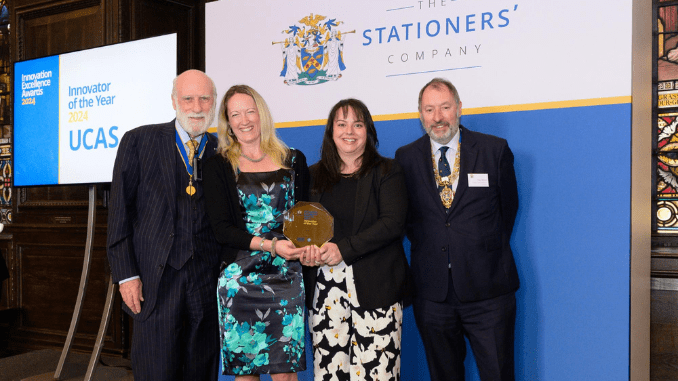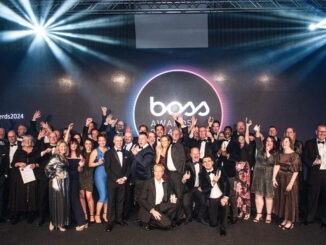
The Innovation Excellence Awards, held at Stationer’s Hall, celebrated industry trailblazers, with UCAS taking the top honour for Innovator of the Year
The winners of the Innovation Excellence Awards have been announced at a packed ceremony and lunch at the historic Stationer’s Hall in London.
Special guest, Vint Cerf – widely regarded as one of the fathers of the internet – presented UCAS with the coveted top prize of Innovator of the Year.
The awards showcase the extraordinary range of innovations taking place across the UK’s content and communications industries. This year the judges looked closely at how brands are performing when it comes sustainability and introduced a new category – Education Technology – to acknowledge the increasing contribution this area is making to the whole industry.
Through the awards, the Stationers’ Company recognises the key role the Communications and Content industries play in the UK economy, highlights outstanding innovation in the sector and offers the opportunity to share best practice.
Some of the communications and content industry’s big hitters came together to celebrate this year’s winners, who were:
- Business Process – Epic Print Ltd for Cupround
- Communications, including Marketing – Barley Communications for Purpose Plus
- Customer Experience – Metaverse Learning Ltd for Metaverse Learning Educational Progams
- Educational Technology – UCAS for Discover Your Choices
- Product Design – Kolbus UK Ltd for AutoBox BX Motion
- Start Up – Perlego for Perlego
- Innovator of the Year – UCAS for Discover Your Choices
Judges reviewed a rigorous set of criteria, including how the innovations improve customer experience, how the innovation meets an unmet need in the market, strength of customer response and scalability for start-ups.
Vint Cerf, Vice President and Chief Internet Evangelist, Google and Honorary Freeman & Liveryman of the Stationers’ Company said:
“Innovation is vital to problem solving, which in my view, is vital to a successful society. In part, it is a function of historical knowledge – what has worked and what has not worked – but it is also out there on the edge of chaos, where we don’t really have any answers and we need data even to begin to imagine exactly what’s going on, which leads to theory, which leads them to engineering, which might lead to an important innovation.”



Be the first to comment